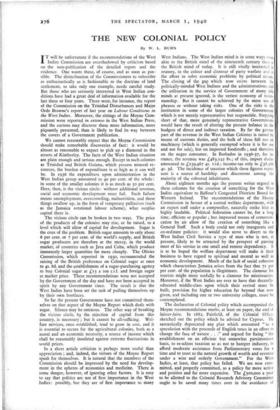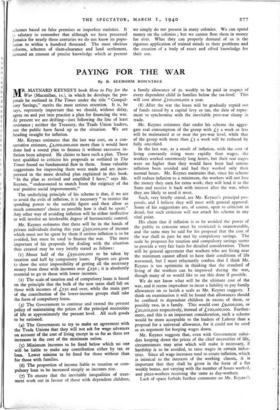THE NEW COLONIAL POLICY
By W. L. BURN Iwill be unfortunate if the recommendations of the West Indies Commission are overshadowed by criticism based on the non-publication of the detailed report and the evidence. One wants these, of course, and as soon as pos- sible. The disinclination of the Commissioners to subscribe as enthusiastically as is fashionable to the doctrine of land settlement, to take only one example, needs careful study. But those who are seriously interested in West Indian con- ditions have had a great deal of information available for the last three or four years. There were, for instance, the report of the Commission on the Trinidad Disturbances and Major Orde Browne's report of last year on Labour Conditions in the West Indies. Moreover, the sittings of the Moyne Com- mission were reported in extenso in the West Indian Press, and the curious may discover there more information, more piquantly presented, than is likely to find its way between the covers of a Government publication.
We cannot reasonably expect that the Moyne Commission should make remarkable discoveries of fact: it would be almost as reasonable to expect to pick up a diamond in the streets of Kimberley. The facts of the West Indian situation are plain enough and serious enough. Except in such colonies as Trinidad and British Guiana, which possess mineral re- sources, the burden of expenditure is as high as it can well be. In 1936 the expenditure upon administration in the West Indian group amounted to 40 per cent. of the whole : in some of the smaller colonies it is as much as 5o per cent. Here, then, is the vicious circle: without additional revenue, social and economic development must fail. Such failure means unemployment, overcrowding, malnutrition, and these things swallow up, in the form of temporary palliatives (such as the Jamaica rotational labour scheme), what surplus capital there is.
The vicious circle can be broken in two ways. The price of the products of the colonies may rise, or be raised, to a level which will allow of capital for development. Sugar is the crux of the problem. British sugar amounts to only about 6 per cent. or 7 per cent. of the world's supply, and British sugar producers are therefore at the mercy, in the world market, of countries such as Java and Cuba, which produce immensely larger quantities far more cheaply. The Olivier Commission, which reported in 1930, recommended the raising of the British preference on Colonial sugar at once to 4s. 8d. and the establishment of a sugar-purchasing agency to buy Colonial sugar at krs a ton c.i.f. and foreign sugar at market price. These. recommendations were not accepted by the Government of the day and have not been accepted in spirit by any Government since. The result is that the West Indies have been set the task of pulling themselves up by their own bootlaces.
So far the present Government have not committed them- selves on that aspect of the Moyne Report which deals with sugar. Silence may be ominous. The other way of breaking the vicious circle, by the injection of capital from this country, is necessary ; but it cannot be all-sufficing. Wel- fare services, once established, tend to grow in cost, and it is essential to secure for the agricultural colonies, both as a moral and an economic necessity, a source of income which shall be reasonably insulated against extreme fluctuations in world prices.
In a short article criticism is perhaps more useful than appreciation ; and, indeed, the virtues of the Moyne Report speak for themselves. It is natural that the members of the Commission should be impressed by the need for develop- ment in the spheres of economics and medicine. There is some danger, however, of ignoring other factors. It is easy to say that politics are not of first importance in the West Indies : possibly, but they are of first importance to many West Indians. The West Indian mind is in some ways more akin to the British mind of the nineteenth century than to the British mind of today. It is still vitally interested io oratory, in the colour and clamour of party warfare and in the effort to solve economic problems by political means. The closing of the gap which now exists between the politically-minded West Indians and the administrations, and the utilisation in the service of Government of many able minds at present ignored, is the veriest economy of states- manship. But it cannot be achieved by the mere use of phrases or without taking risks. One of the risks is the institution in some of the larger colonies of Government which is not merely representative but responsible. Stopping short of that, more genuinely representative Governments would have the result of altering the present balance in the budgets of direct and indirect taxation. By far the greater part of the revenue in the West Indian Colonies is raised by means of customs duties, and the bulk of these fall not on machinery (which is generally exempted where it is for use and not for sale), but on imported foodstuffs ; and therefore on the negro consumer. In Barbados in 1936-37, for in- stance, the revenue was £483,142 8s.; of this, import duties amounted to £239,467 4s. ltd.; income-tax only to £38,386 4s. 3d. The incidence of taxation which these figures repre- sent is a source of hardship and discontent among the majority of the coloured inhabitants.
About eighteen months ago the present writer argued in these columns for the creation of something for the West Indies equivalent to Balfour's Congested Districts Board for Western Ireland. The recommendations of the Moyne Commission in favour of a central welfare department, with an expert staff under a comptroller, naturally strike him a, highly laudable. Political federation cannot be, for a long time, efficient or popular ; but improved means of communi- cation by air allow of the creation of something like a General Staff. Such a body could not only inaugurate and co-ordinate policies: it would also serve to divert to the West Indian Civil Service a type of man who is not, at present, likely to be attracted by the prospect of passing most of his service in one small and remote dependency. It is to be hoped the welfare department will make it their business to have regard to spiritual and mental as well as economic development. Much of the lack of social cohesion which characterises Jamaica arises from the fact that 71 per per cent. of the population is illegitimate. The clamour for tourists might more usefully be a clamour for missionaries. Moreover, if the West Indies are ever to have that decently- educated middle-class upon which their revival must be built, provision for higher education far beyond that now given, and including one or two university colleges, must be contemplated.
The declaration of Colonial policy which accompanied the Moyne recommendations marks, at least on paper, the end of laisser-faire. In 1882, Fairfield, of ,the Colonial Office, sketched out the policy which he advised for Cyprus. He sarcastically deprecated any plan which amounted " to a speculation with the proceeds of English taxes in an effort to change the face of nature . . ." and argued for fixing " the establishment on an efficient but somewhat parsimonious basis, to re-adjust taxation so as not to hamper industry, to afford moderate assistance from Parliamentary votes for time and to trust to the natural growth of wealth and revenue under a wise and orderly Government" For the West Indies, at least, that policy has failed. We are now com- mitted, and properly committed, to a policy far more active and positive and far more expensive. The £500,000 a year to be allotted to the Colonial Research Advisory Committee ought to be saved many times over in the avoidance of schemes based on false premises or imperfect statistics. It is salutary to remember that although we have possessed Jamaica for nearly three centuries we do not know its popu- lation to within a hundred thousand. The most obvious reforms, schemes of slum-clearance and land settlement, demand an amount of precise knowledge which at present we simply do nor possess in many colonies. We can spend money on the colonies ; but we cannot float them in money for ever. What they can properly demand of us is the rigorous application of trained minds to their problems and the creation of a body of exact and sifted knowledge for their use.















































 Previous page
Previous page